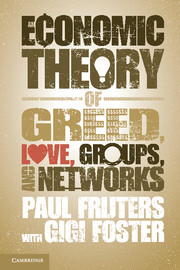4 - Networks and markets
Published online by Cambridge University Press: 05 May 2013
Summary
In this chapter I consider trade networks, the last of the “black boxes” within mainstream economics to be examined and incorporated explicitly into an aggregate view of our socioeconomic system. Trade networks were introduced in Chapter 3 as one of the five group archetypes, and moreover as the only one featuring the peculiar characteristic of being divorced from ideals and other emotional relations between group members. Market economies rely heavily on such anonymous networks, and this chapter is devoted to exploring their role in more detail.
Considering the range of phenomena that can be explained by adding theories about love, power, and groups to basic greed, why do we need networks as well? The major element that the story in this book still lacks is a link between economics and politics. Most importantly, nothing in the story so far would make the emergence of democracy and nation states “inevitable.” Also, many economic phenomena not yet discussed would remain mysterious, were we not to explicitly consider the role of networks. For example, this book has not yet provided a reason why one should observe growth cycles, it has not explained the observation of output collapses upon the breakdown of communist control mechanisms, and it has given no hint about the roles of money and financial institutions in our socioeconomic system. In short, the story so far has ignored many important questions of economics, mainly surrounding the link between the economy and politics. Networks provide the missing puzzle piece and will enable me to address these questions.
- Type
- Chapter
- Information
- An Economic Theory of Greed, Love, Groups, and Networks , pp. 226 - 298Publisher: Cambridge University PressPrint publication year: 2013



